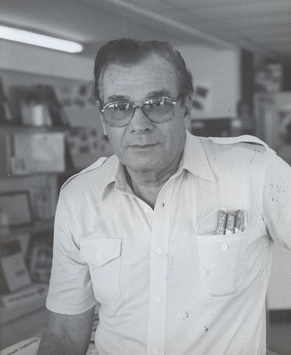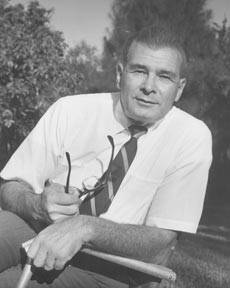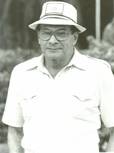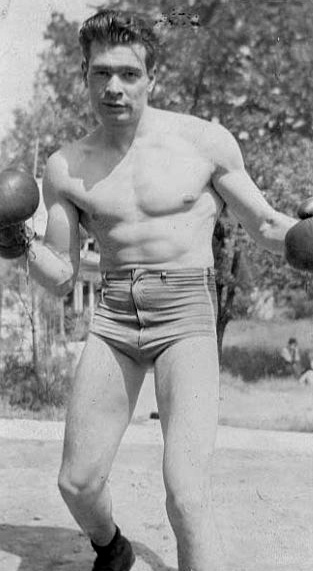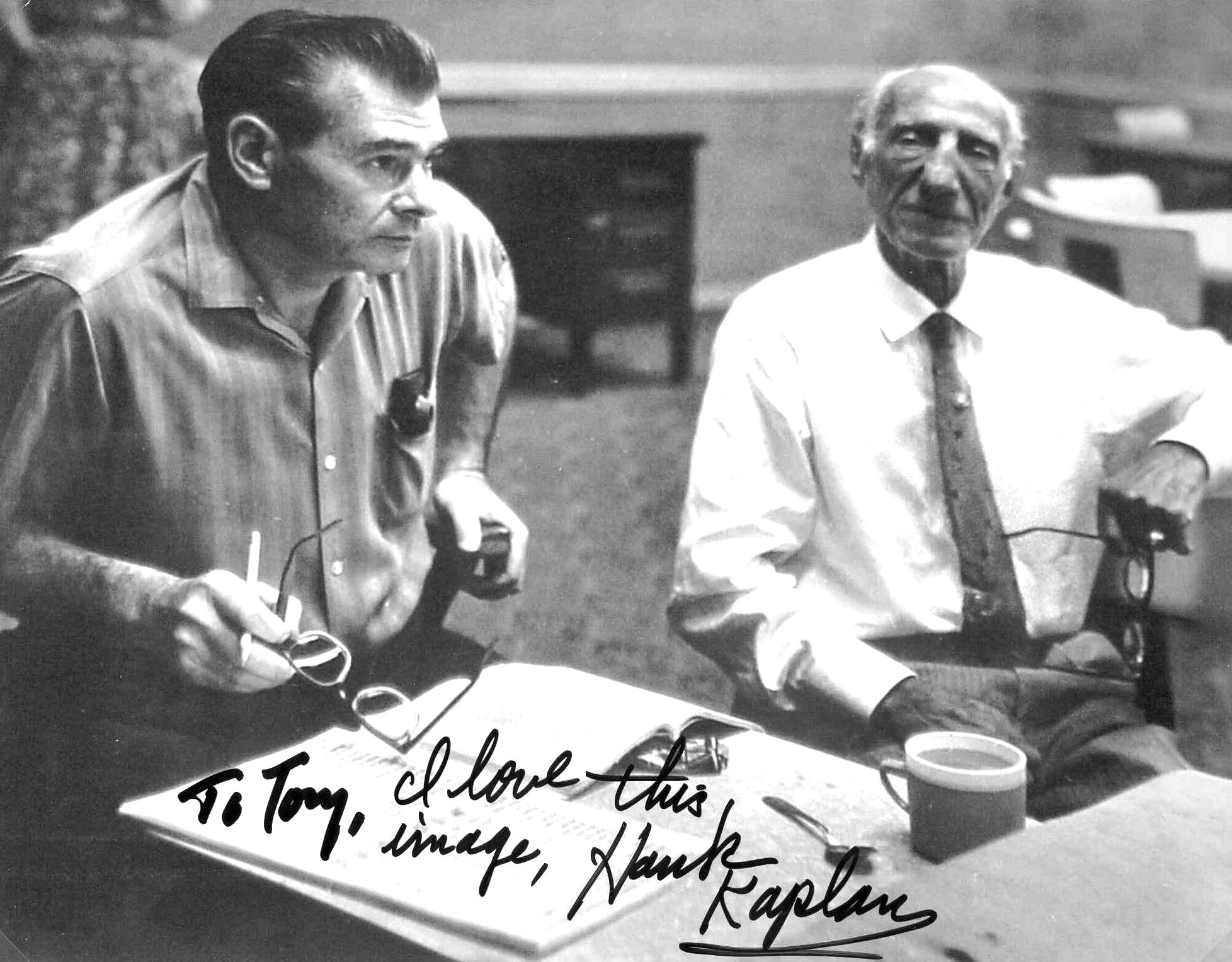Hank Kaplan
|
Born : April 15 1919;
Brooklyn, New York
Died : December 14 2007; Kendall, Florida
Buried : Mount Nebo Cemetery, West Miami, Florida
Hank Kaplan was born in Brooklyn, New York to Jewish immigrant parents
from Lithuania, one of four children. At the age of nine, his father, a
tailor, died of tuberculosis. His mother, a seamstress, struggled to
make ends meet and Hank and his siblings were placed in the Hebrew
Orphan Asylum, also called the Academy (another famous fighter at the
HOA was Izzy 'Corporal' Schwartz). While at the HOA, Hank was sent to
Camp Wakitan in upstate New York where he developed a love for nature,
botany, and boxing. While at Camp Wakitan, a smaller boy bloodied his
nose and a life-long obsession with the sport and its fine points was
born.
Hank boxed as an amateur in the 1930s and had one professional fight in
Bridgeport, Connecticut in the early 1940s, which he won. In his
mid-teens (around 1930), Hank moved back in with his mother, who had
started her own business designing and making bridal and evening gowns.
Hank and his family lived on the Lower East Side and he went to Commerce
High School, although he dropped out because he worked several jobs
(including delivering gowns for his mother) to help pay the rent. He
later completed his high school education, when work permitted.
When World War II broke out, because his idol Jack Dempsey had joined
the Coast Guard, Hank did the same. He went to boot camp in Manhattan
Beach, New York (Dempsey was the commander of the Coast Guard base) and
while there, he met Dempsey's assistant, Dave Shaw. Shaw and Kaplan
became friends and Shaw helped Hank go to chemical warfare school and he
served in the South Pacific. Soon after, Kaplan was loaned by the Coast
Guard to the U.S. Public Health department so he could fumigate boats.
After the war, Hank earned a biology degree at the University of Miami
and worked for 30 years at the Center for Disease Control as a
quarantine officer.
In the 1950s, he met Angelo and Chris Dundee at Miami's famous Fifth
Street Gym and was soon serving as their public relations consultant and
writing up bios and statistics on Dundee's fighters. While he was
helping Dundee and fighters like Ali, Kaplan collected vast amounts of
historical information and became a key source for many sportswriters.
At the same time, Hank began assembling the world’s largest private
boxing library and most extensive collection of boxing photographs and
research resources. He worked daily preserving the legends and lore of
the “sweet science.” Over the next 50 years, he would become recognized
as the foremost historian in the world. His massive archives are now
housed at the Brooklyn College.
In addition to his archives, Hank was the founder and editor of Boxing
Digest magazine, editor of Boxing World and served as consultant to such
media outlets as Sports Illustrated (24 years), London Times, Der Stern
and HBO. For over two decades Hank was The Ring's Florida correspondent
and wrote and published boxing features and historical pieces for boxing
journals all over the world. Authors, filmmakers, researchers and
sportswriters often sought out Hank’s expertise and opinions. Hank
served as a technical director for the Marciano vs. Ali computerized
bout in 1970. He has 254 credits in GOAT, the Ali compendium and the
biggest boxing book ever published.
In 2002 Hank received the James J. Walker Award from the Boxing Writers
Association of America for “Long and Meritorious Service to Boxing.” He
was the first elected president of the World Boxing Historians
Association, and was a permanent Chairman of the International Boxing
Hall of Fame Selection Committee. Kaplan was elected to the World Boxing
Hall of Fame in 1999 and the International Boxing Hall of Fame in 2006.
At 3:00 a.m. on December 14, 2007 at his home in Kendall, Florida, Hank
passed away. His funeral was on December 17th at noon at Temple Israel
with Rabbi Mitchell Chefitz officiating. |
The Associated Press
Saturday, December 15, 2007
MIAMI: Hall of Fame boxing historian Hank Kaplan died Friday, leaving
behind archives that dated to the 1800s. He was 88.
Kaplan died after battling cancer for nearly a year, his daughter,
Barbara Haar-Kaplan, said. His archives include books, letters and
newspaper clippings.
"Boxing was his life, and my dad kept everything he stored in such
pristine condition," Haar-Kaplan said. "But not only was he dedicated to
his sport, he had a genuine concern for people."
A native of Brooklyn, N.Y., Kaplan moved to Miami in the early 1950s. He
worked as quarantine officer with the Centers of Disease Control for 30
years while maintaining ties to boxing.
"One of the nicest things that happened to the sport of boxing was
Hank Kaplan," said trainer Angelo Dundee, who first met Kaplan in 1951.
"I know he did favors for millions of people."
Kaplan wrote books on boxing and was founder and editor of World Wide
Boxing Digest Magazine. He helped maintain the legacy of once-revered
champions and accompanied former world champions Beau Jack and Kid
Gavilan to functions decades after their careers.
Kaplan was on the screening committee that helped approved members of
the International Boxing Hall of Fame in Canastota, N.Y.
"He was finally convinced to remove himself from the screening committee
so his name could be submitted for nomination," said Ed Brophy, the Hall
of Fame's executive director. "Hank was always thinking of others who
were worthy of being selected."
Kaplan was inducted into the Hall of Fame in 2006.
|
|
Dec 14 2007 -
Gentlemen:
The CBZ will forever be indebted to Hank. If you look at our
masthead for 13 years it has listed Hank as: "SPIRITUAL ADVISOR ON
ALL MATTERS FISTIC: HANK KAPLAN"
Hank gave us instant credibility in the boxing world. When the CBZ
started back in '94 boxing people didn't know or give a shit about
the internet. Hank went out of his way to promote us to the boxing
cogneceti. He also contributed articles as well as ALWAYS being
available with sagacious advice.
Basically, without Hank the CBZ just wouldn't be what it is today.
This is really a sad day for us ... & this is just going to kill my
partner, Mike DeLisa, who is in Venezuela, when he finds out. Hank &
Mike were VERY close friends.
I want to give you guys an example about how special Hank's boxing
knowledge was. About 8-9 years ago I was writing a short bio of
former 1920's feather & jr. light champ, Benny "Little Fish" Bass.
I kept reading different reports about his height ranging from 4'11
to 5'3. I called Hank up & asked him if he knew how tall Benny
actually was. He said (& I'm paraphrasing} Me & Dempsey went down to
see Benny fight in Philly in 1923. I stood right next to him at the
weigh in. I'm 5'3 & he was a solid inch shorter than me so I'd say
he was 5'2.
Guys, who the hell else could have given me information like that
other than Hank???
Selah ... Rest In Peace My Dear Friend.
Stephen Gordon
Editor/www.cyberboxingzone.com
WWW.TrufanBoxing's
HALL OF FAME
HANK KAPLAN – CELEBRATION OF A GREAT LIFE
- Ron Ross Dec. 17, 2007
We came to say goodbye to our beloved Hank Kaplan today. There was
no grieving, no mourning, though. Instead, it was a celebration of
his life – an extraordinary life, a giving life, a life always
dedicated to glorifying and commemorating the gallant efforts and
deeds of those young warriors who climbed through the ropes of prize
rings around the world fighting their hearts out whether for
twenty-five dollars or twenty-five million dollars. To Hank, they
were all under one roof and he cloaked them all with dignity and
pride. It was their entitlement.
I was privileged to have Hank as my very dear friend. It’s said that
nobody is perfect, but Hank Kaplan came as close to living up to
that label as anyone I ever knew. I never saw him angry or to lose
his temper. The door to his South Miami home was open to all. His
archives, knowledge and input were never denied, whether to a
best-selling author working on a mega-buck advance boxing biography
or a college English major struggling over a term paper about boxing
as a major sport. All that ever mattered to him was what he could do
to help and enhance the sport and its participants. It was never
about what boxing could do for him.
He had a financial advisor who wanted to make Hank a wealthy man.
Hank explained to him that he already was a wealthy man. He had a
doting wife, a loving son and daughter and a home filled with all
the things he loved, boxing memorabilia and archival material that
he was able to immerse himself in whenever he chose. So he made his
financial advisor a boxing fan.
What made Hank so very special was that he never separated the flesh
and blood aspect from the pen and ink. He was not merely the
guardian of the records, but more importantly, he was the guardian
of those great battlers from champion to contender to prelim boy who
climbed through the ropes to make those records.
Many people who knew Hank as the “Dean” of the International Boxing
Hall of Fame never knew what a multi-faceted person Hank was.
Growing up in the Hebrew Orphan Asylum on the upper west side of
Manhattan during the Depression years Hank quickly developed
contradictory passions, botany and boxing. When Hank’s father passed
away, his mother, a seamstress, couldn’t afford to keep the family
together so Hank and his younger brother Ted were sent to the
orphanage and their sister Ada was sent to a foster home. It was on
a camp outing that young Hank, for the first time in a world not
constructed of cement and concrete, saw trees, flowers and plants
that opened his eyes to a whole new world. He began reading
everything he could get his hands on about botany and biology.
About the same time in his life, some kid about a head and a half
shorter than Hank bopped him on the nose over some meaningless,
lost-in-time argument. Hank could not believe that someone that much
smaller could land a punch on him. So, he decided to study boxing as
a science to find the answer – also to make sure never to get bopped
on the nose again. One thing about Hank Kaplan, he was an A+
student. Once he put his mind to learning something he would sop it
up like a sponge. He never got a rematch but it didn’t matter. He
never did get bopped on the nose again, either. Actually, Hank did
go on to an abbreviated boxing career. One fight, one win.
Meanwhile, his intrigue with boxing became all-consuming. He read
about and analyzed every aspect of the sport. Newspaper articles,
magazine pieces, books, all began blending together forming the
beginning of what was to become the greatest archival collection in
the boxing world.
When it came to toughness and courage, Hank did not take a back seat
to any of the illustrious warriors whose deeds he recorded. His
fight was not in any roped-off ring but in an open arena against an
insidious, invisible opponent not restricted by rules of convention
or morality. He began his battle during World War II with the United
States Coast Guard and continued for another thirty years with the
Centers for Disease Control. It was waged against mankind’s ultimate
enemy, the microbe. Hank Kaplan fought disease and pestilence
throughout the world, always with the knowledge that his life was on
the line, It was in 1963 that he went to Jakarta, Indonesia to fight
perhaps the worst outbreak of bubonic plague of modern times. It was
the one time in his life that he was uncertain of whether he would
make it back home.
It was after World War II that Hank settled in Miami and an intrigue
that began as a kid in an orphanage now flourished as he met Chris
and Angelo Dundee, began collecting boxing memorabilia and did the
promotional work for the Dundees and the legendary Fifth Street Gym.
He started the original Boxing Digest magazine and hooked up with a
young kid, Ramiro Ortiz, who went on to become President of Bank
United and Boxing Commissioner in Miami, to promote boxing shows at
the War Memorial in Fort Lauderdale.
Perhaps it was coincidental, maybe it was meant to be. Hank’s wife
Sylvia came from Louisville. It was while they were dating that Hank
met this young kid, Cassius Clay. He went to the youngster’s high
school graduation and they joined together in Miami when Hank became
the treasurer of the Muhammad Ali Foundation.
Hank Kaplan was a charter member of the International Boxing Hall of
Fame as the head of the selection committee. In 2006 he was asked to
step down temporarily as there was a regulation stipulating that no
member of the board was eligible for induction. Hank Kaplan was then
accorded the highest of honors by being elected into the
International Boxing Hall of Fame. It fills me with a great sense of
pride to remember Hank asking me to ride alongside him in the
Induction parade.
The memories I have of Hank will always keep him alive in my heart.
I cherish those special moments like the night in Atlantic City with
Hank wrestling with a squirming Beau Jack, trying to get a tie
around his neck before a boxing banquet in Atlantic City; or the
afternoons and evenings Hank and I would spend in a Cuban restaurant
with Beau Jack and Kid Gavilan, with Hank lovingly cutting the Kid’s
Palomillo steak into bite-size pieces for him. I’ll never forget the
Hank Kaplan who sat at the side of Beau Jack’s hospital bed, holding
the wonderful little battler’s hand, guiding him gently to his final
rest. I will always cherish the memory of an aerobic walk with Hank
whose long walks took so much longer than they should as we stopped
to examine the leaves of this tree or the petals of a flower at the
side of the road. Puffing on his pipe he was as gentle and caring wi
th these species as he was with his legions of prizefighters.
So, we gathered at the Mt. Nebo Memorial Gardens in Kendall, Florida
to celebrate this wonderful life. Friends and relatives got up to
tell of those special moments that would forever enshrine Hank in
their hearts. Ed Brophy, Director of the International Boxing Hall
of Fame, whose flight was cancelled because of poor weather
conditions, sent a message detailing the impact that Hank Kaplan had
on his life and how his spirit and passion touched the lives of so
many in the boxing community. They flew the flags at half mast in
Canastota in Hank’s memory. Angelo Dundee could not hold back the
choked sobs as he reminisced their early days in the Fifth Street
Gym. It made each of us realize what special qualities this amazing
person possessed.
Yes, there were tears shed. But you had to put things in
perspective. When the sun is blotted out by a large, dark cloud we
are still bathed in and luxuriate in the warmth of its afterglow.
The warmth and love that Hank Kaplan brought to all who knew him can
never be blotted out. We will always be able to luxuriate in his
afterglow.
|
